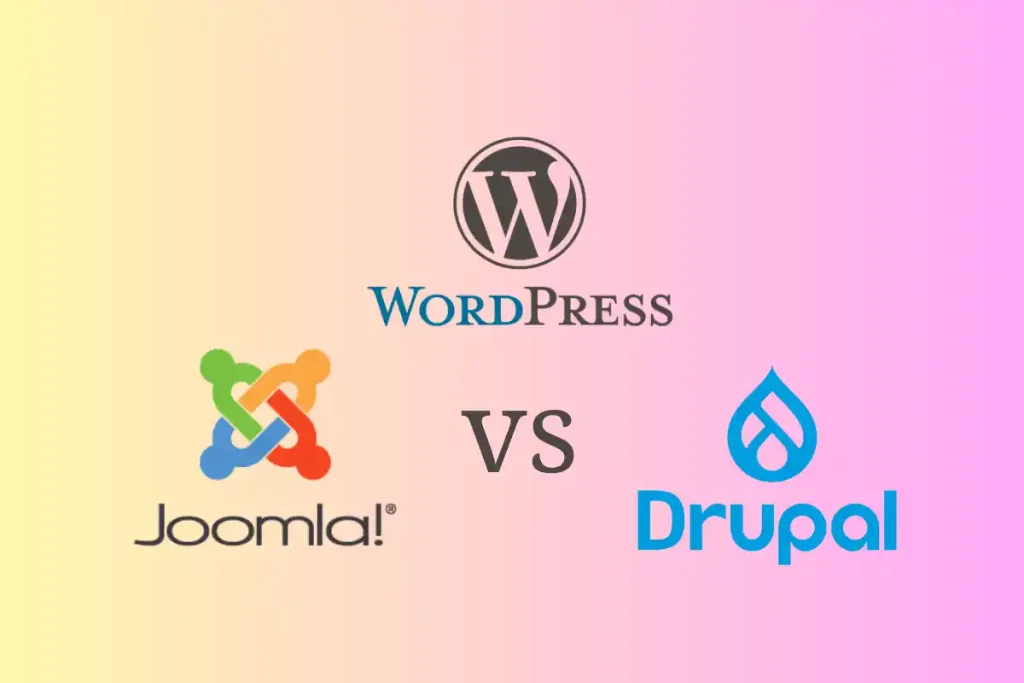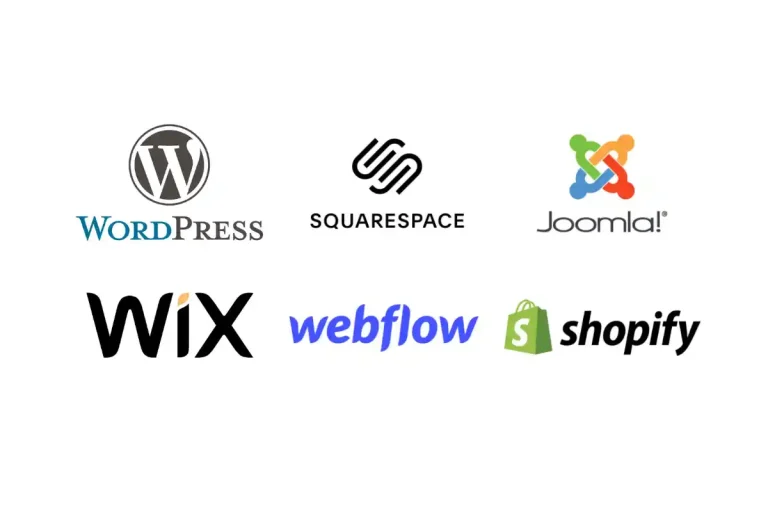WordPress vs. Joomla vs. Drupal: Which CMS is Best in 2025?
In this WordPress vs. Joomla vs. Drupal, we’ll compare WordPress, Joomla, and Drupal based on key factors like ease of use, security, flexibility, SEO, and performance. By the end, you’ll have a clear idea of which CMS is the best fit for your website. Overview of WordPress, Joomla, and Drupal Before diving into the details,…

In this WordPress vs. Joomla vs. Drupal, we’ll compare WordPress, Joomla, and Drupal based on key factors like ease of use, security, flexibility, SEO, and performance. By the end, you’ll have a clear idea of which CMS is the best fit for your website.
Overview of WordPress, Joomla, and Drupal
Before diving into the details, let’s take a quick look at each CMS.
| CMS | Market Share | Best For | Ease of Use | Flexibility | Security |
| WordPress | 40% + of all websites | Blogs, business sites, and e-commerce | Very Easy | High (Plugins & Themes) | Very Good (With Plugins) |
| Joomla | ~3% of websites | Business & community sites | Moderate | High (Built-in Features) | Strong |
| Drupal | ~1.5% of websites | Enterprise, government sites | Difficult | Very High (Custom Development) | Very Strong |
Now, let’s break down their features in detail.
1. Ease of Use: Which CMS is the Most User-Friendly?
For beginners and non-technical users, ease of use is a major factor.
WordPress: The Easiest to Use
- WordPress is designed for beginners and is the easiest CMS to set up.
- Comes with a simple, intuitive dashboard for managing content.
- Huge library of themes and plugins for customization without coding.
- Perfect for bloggers, small businesses, and non-technical users.
Joomla: A Steeper Learning Curve
- Joomla is more complex than WordPress but offers greater flexibility.
- Has built-in multilingual support, unlike WordPress, which requires plugins.
- Offers advanced user management, making it ideal for membership or community sites.
Drupal: Best for Developers
- Drupal is not beginner-friendly and requires coding knowledge.
- Provides unmatched flexibility for developers to create custom websites.
- Best suited for enterprise, government, and high-security websites.
🏆 Winner: WordPress – Easiest to learn and use, even for beginners.
2. Flexibility & Customization: Which CMS Offers More Control?
A flexible CMS allows users to customize their websites with themes, templates, and extensions.
WordPress: Huge Plugin & Theme Library
- Offers 60,000+ plugins for adding functionality like SEO, eCommerce, and security.
- Thousands of free and premium themes for website customization.
- Highly flexible but relies on third-party plugins for advanced features.
Joomla: Powerful Built-in Features
- Has many advanced features built into the core, reducing the need for plugins.
- Offers module-based customization for greater design flexibility.
- Less reliant on third-party extensions compared to WordPress.
Drupal: The Most Customizable (For Developers)
- Allows developers to create fully custom-built websites without limitations.
- Strong taxonomy system for managing complex content structures.
- Requires coding knowledge for deep customization.
🏆 Winner: Tie – WordPress (for non-coders) & Drupal (for developers).
3. Security: Which CMS is the Most Secure?
Security is a major concern, especially for business and e-commerce websites.
WordPress: Secure But Requires Plugins
- WordPress is frequently targeted by hackers due to its popularity.
- Security depends on using plugins like Wordfence, Sucuri, and iThemes Security.
- Regular updates are needed to protect against vulnerabilities.
Joomla: Stronger Security Out of the Box
- Joomla has strong built-in security features, such as two-factor authentication (2FA).
- Requires fewer third-party extensions for security.
- Less frequent updates than WordPress, but still needs monitoring.
Drupal: The Most Secure CMS
- Drupal is the preferred choice for government and enterprise websites.
- Fewer security vulnerabilities due to its strict coding standards.
- The advanced user permission system makes it the most secure option.
🏆 Winner: Drupal – Best choice for websites requiring high security.
4. SEO: Which CMS Helps You Rank Better?
Search Engine Optimization (SEO) is essential for attracting visitors.
WordPress: Best SEO Plugins
- Plugins like Yoast SEO and Rank Math make WordPress the easiest CMS for SEO.
- User-friendly tools for optimizing meta tags, sitemaps, and content.
- Faster indexing with Google XML Sitemaps and structured data support.
Joomla: Built-in SEO Features
- Has basic SEO tools built into the core, like metadata and URL rewriting.
- Supports SEO-friendly URLs but requires manual configuration.
- Fewer SEO plugins compared to WordPress.
Drupal: Great for Technical SEO
- Excellent for enterprise SEO with built-in schema and structured data tools.
- Provides more advanced SEO customization but requires coding knowledge.
- Faster performance helps with Core Web Vitals, boosting rankings.
🏆 Winner: WordPress – Easiest for beginners with powerful SEO plugins.
5. Performance & Speed: Which CMS Loads Faster?
Website speed affects user experience, SEO rankings, and conversion rates.
WordPress: Can Be Slow Without Optimization
- Speed depends on hosting, themes, and plugins.
- Requires optimization (caching, image compression, CDN) to improve speed.
Joomla: Better Performance Than WordPress
- More lightweight than WordPress but still requires optimization.
- Supports caching and optimization extensions for better speed.
Drupal: Fastest Performance
- Built for high performance with fewer resource requirements.
- Handles large amounts of content and traffic more efficiently.
- Best for enterprise sites needing fast load times.
🏆 Winner: Drupal – The fastest CMS, but requires technical expertise.
Conclusion: Which CMS Should You Choose in 2025?
The best CMS depends on your needs and technical expertise. Here’s a quick recommendation:
- Choose WordPress if you need a user-friendly CMS with lots of plugins, themes, and SEO tools. Perfect for bloggers, small businesses, and non-technical users.
- Choose Joomla if you want a balance between flexibility and ease of use, with strong built-in features. Ideal for community websites and businesses.
- Choose Drupal if you need the most secure, high-performance, and customizable CMS. Best for enterprise and government websites.
Final Verdict:
🏆 Best Overall (for most users): WordPress
🏆 Best for Advanced Users & Businesses: Joomla
🏆 Best for Security & Performance: DrupalNo matter which CMS you choose, keeping it updated, optimized, and secure will ensure your website runs smoothly in 2025 and beyond! 🚀



